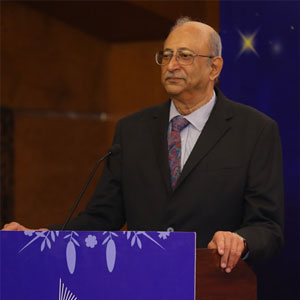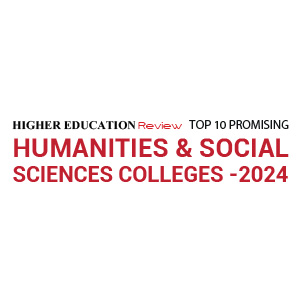
Sai University: Encouraging Social Engagement & Responsibility Through A Liberal Arts Perspective
By K V Ramani, Founder & Chancellor
The liberal education model is gradually making its presence felt in India, bringing with it a transformative shift in the way higher education is perceived and delivered. While traditional Indian education has been heavily focused on specialized learning and routine memorization, the liberal arts approach offers an interdisciplinary curriculum that fosters critical thinking, creativity, and adaptability. Sai University is one of the forerunners of this change, contributing to a broader understanding of education that integrates diverse fields of knowledge.
The Emergence of Liberal Arts Education in India
Liberal education, a relatively new concept in India, is gaining momentum. Initially led by prominent universities, this model promotes a flexible, interdisciplinary approach to learning. It emerged partly as a response to the increasing number of Indian students pursuing degrees abroad, especially in the U.S. and Europe, where liberal arts programs are well-established. Sai University, a pioneer in southern India, offers similar education at a fraction of the cost. It embraces a paradigm shift, focusing on creating adaptable lifelong learners ready to face the evolving job market and complex global challenges.
Sai University provides an education that meets international standards while preparing students for success in both global and local contexts. Emphasizing India’s evolving economic landscape, the university’s interdisciplinary approach allows students to explore diverse subjects, ensuring a well-rounded education. In today’s rapidly changing industries driven by AI and automation, adaptability is crucial. This university’s flexible curriculum focuses on developing a broad skillset, combining technical knowledge with key soft skills like critical thinking, communication, and problem-solving, to equip students for future careers and challenges in a dynamic job market.
Curriculum & Skill Development
Sai University’s educational philosophy centers on preparing students for the evolving job market, recognizing that many current jobs may disappear, and new opportunities will emerge as technology advances. “Our university’s curriculum is designed to emphasize lifelong learning and adaptability, ensuring students are equipped for the uncertain future. Our university promotes interdisciplinary learning, allowing students to explore subjects beyond their major, and fostering curiosity and intellectual flexibility. We have also incorporated experiential learning, offering students practical, real-world experience”, says Dr. Toleti Subba Rao, Acting Dean (School of Arts and Sciences), Sai University.
In addition to technical skills, Sai University prioritizes the development of critical soft skills like communication, teamwork, and problem-solving. Understanding that technical expertise alone isn’t sufficient for success, the university integrates these essential skills into its programs, ensuring students are well-grounded and prepared for diverse careers.
Sai University cultivates curious minds, empowering students with knowledge and skills to thrive in a dynamic, global landscape
Sai University’s dedication to world-class education is reflected in its distinguished faculty. The university prioritizes hiring professors who meet government standards and bring a global perspective to teaching. Its rigorous recruitment process, involving senior faculty, deans, and external experts, ensures only the most qualified candidates are selected. The university seeks faculty who excel in both teaching and research, keeping students at the forefront of their fields. Emphasizing international experience, the university aims to provide a global education that remains deeply connected to the Indian context.
Furthermore, Sai University offers a range of scholarships to make its education accessible to students from diverse backgrounds. Speaking more on this, T.S. Gopi Rethinaraj, Professor (Physics, Sustainability and Public Policy, School of Arts and Sciences) adds, “Committed to supporting meritorious and economically disadvantaged students, our university provides scholarships based on academic merit, extracurricular achievements, and financial need. For instance, students excelling in national-level sports or activities can receive substantial aid. Additionally, financial assistance is offered on a case-by-case basis to ensure deserving students can pursue education without financial barriers”.
Extracurricular Activities & Holistic Development
Sai University emphasizes both intellectual and personal development by offering diverse extracurricular activities. Student-run clubs like the Music, Debate, and Astronomy Club, which encourage leadership and teamwork. The university also provides entrepreneurship courses led by its Chancellor, a tech entrepreneur, offering practical insights into business and innovation. Additionally, a retired Indian Army general leads a leadership and team-building program. These initiatives ensure that the students graduate as well-grounded individuals, ready to navigate the complexities of the modern world.
Looking ahead, Sai University’s future vision focuses on continuous innovation and enhancing educational quality. The university plans to introduce new programs in biotechnology, environmental sciences, and sustainability to address global challenges like climate change. This reflects its commitment to preparing students for careers in emerging fields. Additionally, Sai University aims to strengthen its existing programs in arts, sciences, law, computing and data science, ensuring students receive a holistic education that combines theoretical knowledge with practical application, equipping them for the evolving needs of the world.
In conclusion, Sai University stands as a testament to the growing importance of liberal arts education in India. By embracing an interdisciplinary, global approach to learning, the university is preparing students for the uncertainties of the future job market while ensuring they have the skills and knowledge to thrive in both local and international contexts. As one of the few institutions in India to fully adopt this model, this university is setting a benchmark for higher education, creating a new generation of lifelong learners equipped to navigate the 21st century complexities.


